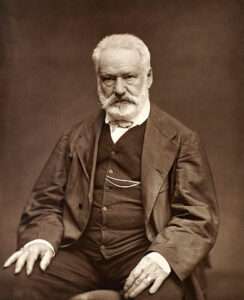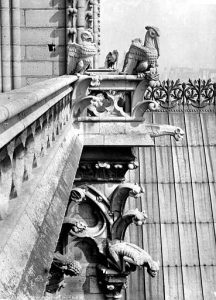|Immense talent|
Victor Hugo (1802 – 1885) is un monstre sacré of French literature. A sacred monster is an expression to qualify someone whose talents are far superior to ordinary mortals. He was a poet, a novelist, a playwright and a politician, committed to defend the poorest. Connected to peace and freedom, very sensitive to human misery, he spoke out in favor of many social advances such as social justice, opposed the death penalty, fight for press freedom and supported the idea of the Republic and of a unified Europe.

Victor Hugo Timeline
Early Life
- February 26, 1802: Victor Hugo is born in Besançon, France.
- 1809: The Hugo family moves to Paris.
Early Career
- 1815-1818: Hugo attends Lycée Louis-le-Grand in Paris.
- 1819: Wins his first literary prize from the Académie des Jeux Floraux.
- 1822: Publishes his first book of poetry, “Odes et poésies diverses”.
Rise to Fame
- 1827: Publishes the preface to his play “Cromwell”, which becomes a manifesto for the Romantic movement.
- 1831: Publishes the novel “Notre-Dame de Paris” (The Hunchback of Notre-Dame), which achieves great success.
Political Involvement
- 1841: Elected to the Académie Française.
- 1848: Participates in the French Revolution of 1848 and is elected to the Constitutional Assembly.
- 1851: Opposes Louis-Napoléon Bonaparte’s coup d’état and is forced into exile.
Exile and Later Works
- 1851-1870: Lives in exile in Brussels, Jersey, and Guernsey.
- 1862: Publishes “Les Misérables”, which becomes one of his most famous works.
- 1866: Publishes “Les Travailleurs de la Mer” (Toilers of the Sea).
- 1869: Publishes “L’Homme qui rit” (The Man Who Laughs).
Return to France and Later Life
- 1870: Returns to France after the fall of the Second Empire.
- 1872: Publishes “Quatrevingt-treize” (Ninety-Three), his last novel.
- 1876: Elected to the French Senate.
- 1881: Celebrates his 79th birthday with a grand public celebration in Paris.
Death
- May 22, 1885: Victor Hugo dies in Paris.
- June 1, 1885: His funeral is attended by millions, and he is buried in the Panthéon in Paris.
Victor Hugo’s life was marked by his contributions to literature, his political activism, and his enduring influence on French culture.
Victor Hugo biography
Third and last child of Joseph Hugo and Sophie Trébuchet, Victor Hugo was born in Besançon on February 26, 1802. His father was a republican then Bonapartist, and his mother was a royalist and Vendée. After stays in Marseille, Bastia and on the island of Elba, the family left Italy and settled in Paris, in 1804. The family lived 76 rue Neuve-des-Petits-Champs for nearly 5 years. Today, it corresponds to number 20 rue Danielle-Casanova.
First education, made of travels (Naples, Madrid) and readings to satiety, he made brilliant studies in Paris. He composed his first verses and a tragedy (Irtamène, 1816). He wanted to be a writer; he was catholic and monarchist. Then, he turned in favor of the Republic. He saved Notre Dame cathedral from collapse.

Place des Vosges in 1848
In 1832, Victor Hugo moved into an apartment in the Hôtel de Rohan-Guémené, at number 6 Place Royale, which would become the very famous Place des Vosges in 1848. For 16 years, the author of Notre-Dame-de- Paris wrote several of its major works there, including Lucrèce Borgia and Ruy Blas, as well as part of Les Misérables and Les Contemplations. He will also receive some of the most illustrious writers and thinkers of his time, including Balzac, Lamartine, Alfred de Vigny and Prosper Mérimée.

A defender of dignity and human beings, of civil and political rights, he advocates the abolition of the death penalty, universal suffrage and press freedom. His powerful commitment became literary: the Punishments (1853), Contemplations (1856), Legend of the Centuries (1859, 1877, 1883), Les Miserables (1862), Workers of the Sea (1866), The Man Who Laughs (1869).
In the 16th arrondissement
At the end of November 1878, Victor Hugo moved to 130, avenue d’Eylau, in a mansion in the 16th arrondissement that had belonged to the Princess of Lusignan. On February 27, 1881, more than 600,000 people will parade under its windows to celebrate its entry into its 80th year!
His resolutely republican commitment in the second part of his life and his immense literary work made him an emblematic figure, whom the Third Republic honored with a national funeral and the transfer of his remains to the Panthéon in Paris on June 1, 1885, 10 days after his death.
Major Victor Hugo novels
- 1818 : Bug-Jargal
- 1823 : Han d’Islande
- 1829 : Le Dernier Jour d’un condamné
- 1831 : Notre-Dame de Paris
- 1834 : Claude Gueux
- 1862 : Les Misérables
- 1866 : Les Travailleurs de la mer
- 1869 : L’Homme qui rit
- 1874 : Quatrevingt-treize
Poems of Victor Hugo
- 1822 : Odes et poésies diverses
- 1824 : Nouvelles Odes
- 1828 : Odes et Ballades (incluant les deux recueils précédent)
- 1829 : Les Orientales
- 1831 : Les Feuilles d’automne
- 1835 : Les Chants du crépuscule
- 1837 : Les Voix intérieures
- 1840 : Les Rayons et les Ombres
- 1853 : Les Châtiments
- 1856 : Les Contemplations
- 1859 : Première série de La Légende des siècles
- 1865 : Les Chansons des rues et des bois
- 1872 : L’Année terrible
- 1877 : L’Art d’être grand-père
- 1877 : Nouvelle série de La Légende des siècles
- 1878 : Le Pape
- 1879 : La Pitié suprême
- 1880 : Religions et religion
- 1880 : L’Âne
- 1881 : Les Quatre Vents de l’esprit
- 1883 : Série complémentaire de La Légende des siècles
Victor Hugo Museum
On the occasion of Victor Hugo’s centenary in 1902, his faithful friend Paul Meurice, with the support of the Hugo family, decided to create a museum in his memory and his works in the Hôtel de Rohan Guéménée, 6, place des Vosges in Paris where the poet lived between 1832 and 1848, in the apartment located on the second floor.
Victor Hugo whose immense talent can seem almost abnormal, and whom few people would dare to criticize. Exceptional man for his involvement in the battles of his time as much as for the fruitfulness of his literary work, Hugo dominated the 19th century with majesty. Enjoy a private tour guide in Paris about Victor Hugo.
Emy,

